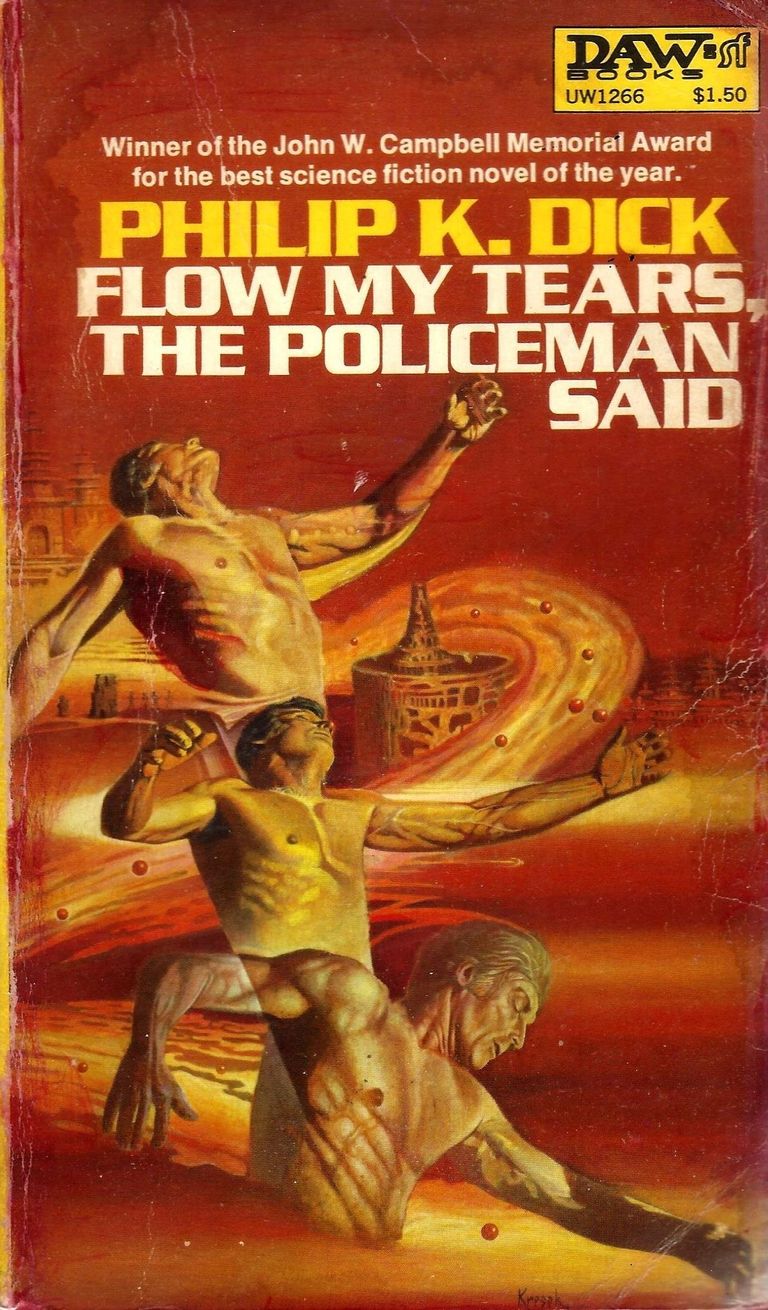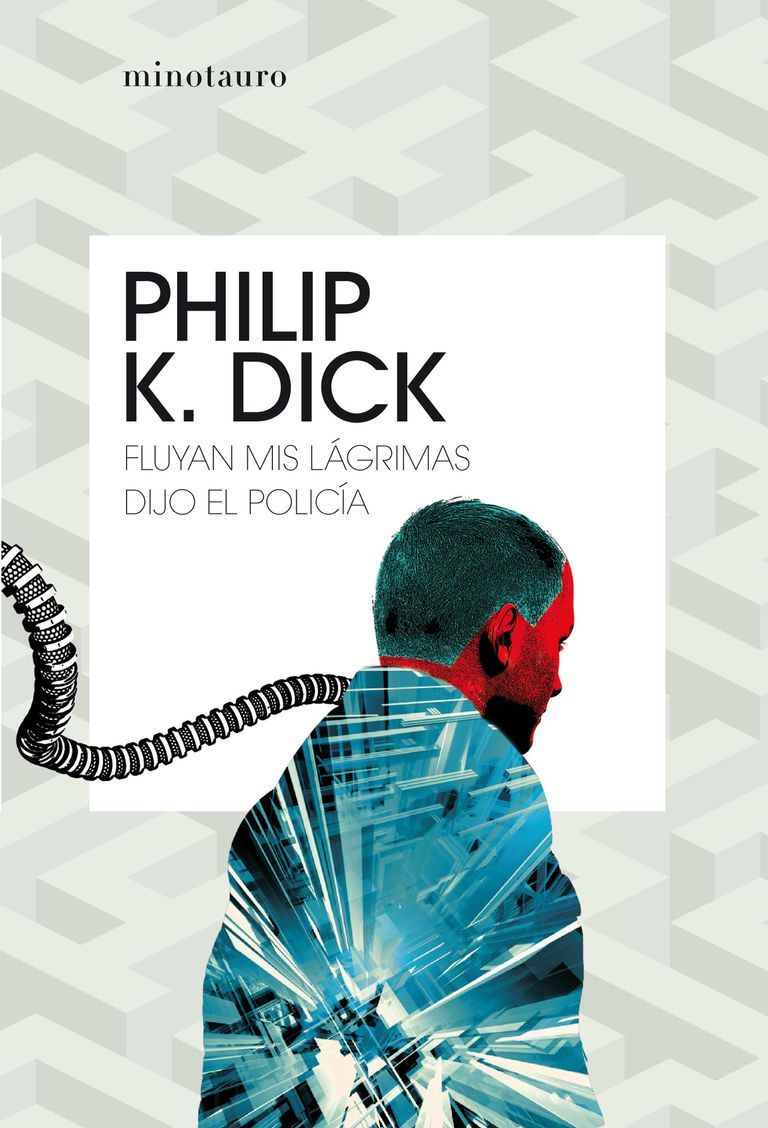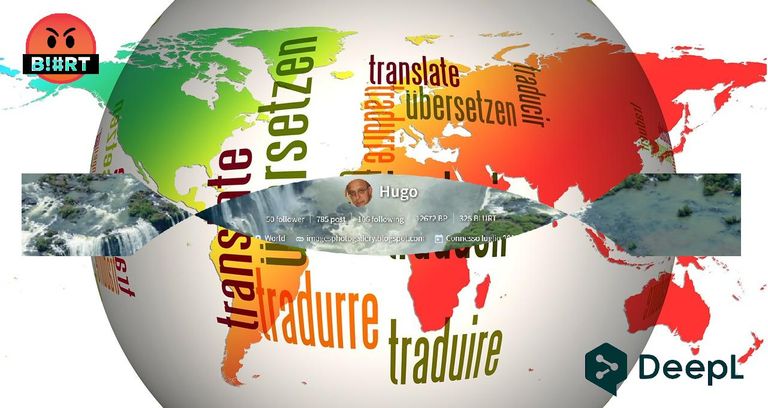
Flow My Tears, the Policeman Said is a science fiction novel by Philip K. Dick.
It was first translated into Italian in 1976 under the title Episodio temporal di Roberta Rambelli (it was then retranslated by Vittorio Curtoni in 1998 and again by Maurizio Nati in 2007).
Written in 1974, it is considered one of the author's best works; it stands out for a remarkable compactness of the plot, fast and free of digressions, at the center of which remain Dick's typical obsessions: social control, psychosis, the uncertainty of the boundary between reality and fiction, altered states of consciousness and the use of psychotropic substances, distrust of the female universe.
Fluyan mis lágrimas, dijo el policía es una novela de ciencia ficción de Philip K. Dick.
Fue traducido al italiano por primera vez en 1976 con el título Episodio temporal de Roberta Rambelli (luego fue retraducido por Vittorio Curtoni en 1998 y nuevamente por Maurizio Nati en 2007).
Escrita en 1974, es considerada una de las mejores obras del autor; destaca por una notable compacidad de la trama, rápida y libre de digresiones, en el centro de la cual permanecen las obsesiones típicas de Dick: el control social, la psicosis, la incertidumbre del límite entre realidad y ficción, los estados alterados de conciencia y el uso de psicotrópicos. sustancias, desconfianza hacia el universo femenino.

Flow My Tears, the Policeman Said is a science fiction novel by Philip K. Dick.
It was first translated into Italian in 1976 under the title Episodio temporal di Roberta Rambelli (it was later retranslated by Vittorio Curtoni in 1998 and again by Maurizio Nati in 2007).
The title comes from Flow My Tears, a song for lute and voice by John Dowland, a 16th-century English composer. The work begins thus:
Flow, my tears, fall from their springs,
Forever exiled, let me weep
Where the black bird of night sings its sad infamy,
There let me live helpless.
It was nominated for the two most important awards in science fiction literature, the Hugo Award and the Nebula Award.
In the context of the 20th century cultural industry, Philip Dick manages to exploit a niche literary genre such as science fiction to propose dystopian, apocalyptic scenarios, always extremely critical of society. In a historical and cultural context in which philosophy, which should assume the responsibility of criticism and constitute the vanguard of the cultural revolt, shows itself disinterested in the social sphere, where historically the theories proposed by the Frankfurt School have not been followed academically, it is in the narrative where the germ of social criticism resides.
Philip Dick takes on the challenge of his time by staging worlds that crumble, certainties that collapse or vanish into thin air, characters who are helpless before the world and yet capable, in some way, of saving themselves by appealing precisely to their fragile lives. humanity.
El título proviene de Flow My Tears , una canción para laúd y voz de John Dowland. , compositor inglés del siglo XVI. El trabajo comienza así:
Fluyan, mis lágrimas, caigan de sus manantiales,
Exiliadas para siempre, déjenme llorar
Donde el pájaro negro de la noche canta su triste infamia,
Allí déjenme vivir desamparado.
Fue nominada a los dos premios más importantes de literatura de ciencia ficción, el Premio Hugo y el Premio Nebula.
En el contexto de la industria cultural del siglo XX, Philip Dick consigue explotar un género literario de nicho como es la ciencia ficción para proponer escenarios distópicos, apocalípticos, siempre extremadamente críticos con la sociedad. En un contexto histórico y cultural en el que la filosofía, que debería asumir la responsabilidad de la crítica y constituir la vanguardia de la revuelta cultural, se muestra desinteresada en el ámbito social, donde históricamente las teorías propuestas por la Escuela de Frankfurt no han sido seguidas en la Académicamente, es en la narrativa donde reside el germen de la crítica social.
Philip Dick asume el desafío de su tiempo poniendo en escena mundos que se desmoronan, certezas que se derrumban o se desvanecen en el aire, personajes indefensos ante el mundo y, sin embargo, capaces, de alguna manera, de salvarse apelando precisamente a sus frágiles vidas. humanidad.

The events take place in 1988, fourteen years after the volume was published. We intuit, from references that are never explicit, the existence of a police state that controls the entire planet after a kind of great war: the population is divided into genetic castes; students, perceived as a social danger, are locked up in their universities to starve; subversives are sent to concentration camps, subjected to forced labor.
The protagonist, Jason Taverner, possessor of an enhanced genetic code, is a singer and presenter of a world-famous television show. After a confrontation with his former lover, he finds himself in the hospital and, therefore, unconscious, in a very low-class hotel. Despite being in possession of his memory, his existence seems to have been erased from the world: no one remembers him, he has no documents and there is not a single trace of his past anywhere on the planet until the day before. In particular, his details are missing from state and police files: he therefore risks being arrested and imprisoned at any time.
The book follows the two days in which Jason transitions between search and escape, to recover his identity and discover, in a now strange and hostile world, the mystery linked to his social disappearance. While events determine the characters more than the other way around, the author takes advantage of this to show with pessimism a near future where behind the order and legality of an iron state and the golden patina of entertainment, poverty, corruption, decadence and madness.
Los hechos tienen lugar en 1988, catorce años después de la publicación del volumen. Intuimos, a partir de referencias nunca explícitas, la existencia de un Estado policial que controla todo el planeta tras una especie de gran guerra: la población está dividida en castas genéticas; los estudiantes, percibidos como un peligro social, son encerrados en sus universidades para pasar hambre; los subversivos son enviados a campos de concentración, sometidos a trabajos forzados.
El protagonista, Jason Taverner, poseedor de un código genético mejorado, es cantante y presentador de un programa de televisión de fama mundial. Tras un enfrentamiento con una ex amante suya, se encuentra en el hospital y, por tanto, inconsciente, en un hotel de muy baja categoría. A pesar de estar en posesión de su memoria, su existencia parece haber sido borrada del mundo: nadie se acuerda de él, no tiene documentos y no existe ni un solo rastro de su pasado en todo el planeta hasta el día anterior. En particular, sus datos faltan en los archivos estatales y policiales: por lo tanto, corre el riesgo de ser arrestado y encarcelado en cualquier momento.
El libro sigue los dos días en los que Jason transita entre la búsqueda y la fuga, para recuperar su identidad y descubrir, en un mundo ahora extraño y hostil, el misterio vinculado a su desaparición social. Si bien los acontecimientos determinan a los personajes más que al revés, el autor aprovecha para mostrar con pesimismo un futuro cercano donde detrás del orden y la legalidad de un Estado férreo y la pátina dorada del entretenimiento, la pobreza, la corrupción, la decadencia y la locura.

Dick's fundamental questions are two: What is reality and What is man? These are questions closely linked to each other and to the subjective-objective dynamic. Dick starts from the assumption that each human being lives in his own reality, given by his own perceptions. In this sense, the world of a schizophrenic is no less real than the world of a person considered sane, the only problem is the inability to communicate. If a schizophrenic could clearly show us his way of seeing the world, it would be possible for him to convince us that he was right. We have, then, on the one hand, a plurality of worlds, all equally real, and, on the other, a plurality of subjects who create or interpret these worlds.
Las preguntas fundamentales de Dick son dos: Qué es la realidad y Qué es el hombre. Se trata de cuestiones estrechamente vinculadas entre sí y con la dinámica subjetivo-objetiva. Dick parte del supuesto de que cada ser humano vive en su propia realidad, dada por sus propias percepciones. En este sentido el mundo de un esquizofrénico no es menos real que el mundo de una persona considerada cuerda, el único problema es la incapacidad de comunicarse. Si un esquizofrénico pudiera mostrarnos claramente su forma de ver el mundo sería posible que pudiera convencernos de que tenía razón. Tenemos entonces, por un lado, una pluralidad de mundos, todos igualmente reales, y, por otro, una pluralidad de sujetos que crean o interpretan estos mundos.


El crédito por las imágenes de los divisores e imagen final va a YoPriceGallery. y a UnsplashLos he modificado usando el programa de distribución libre y gratuita Kolour Paint. / Credit for the images of the dividers and final image goes to YoPriceGallery and UnsplashI modified them using the freely distributed Kolour Paint.



| Blogs, Sitios Web y Redes Sociales / Blogs, Webs & Social Networks | Plataformas de Contenidos/ Contents Platforms |
|---|---|
| Mi Blog / My Blog | Un Libro de Cabecera. |
| Mi Blog / My Blog | Rasetipi. |
| Red Social Twitter / Twitter Social Network | @hugorep |
Upvoted. Thank You for sending some of your rewards to @null. Get more BLURT:
@ mariuszkarowski/how-to-get-automatic-upvote-from-my-accounts@ blurtbooster/blurt-booster-introduction-rules-and-guidelines-1699999662965@ nalexadre/blurt-nexus-creating-an-affiliate-account-1700008765859@ kryptodenno - win BLURT POWER delegationNote: This bot will not vote on AI-generated content
Thanks!